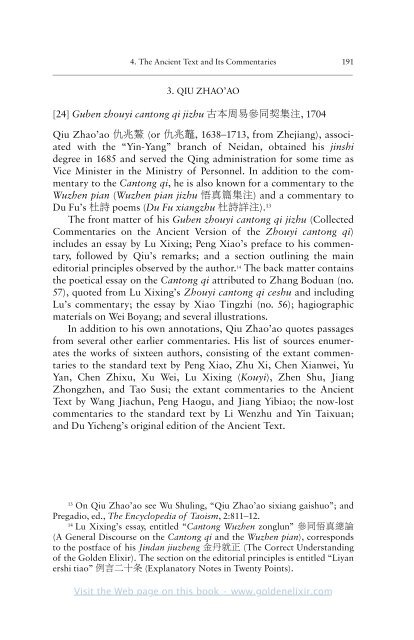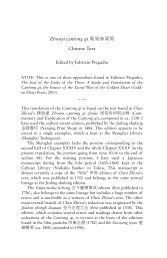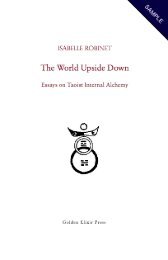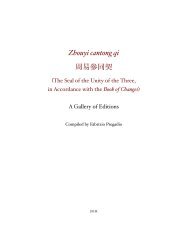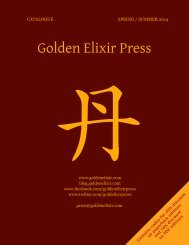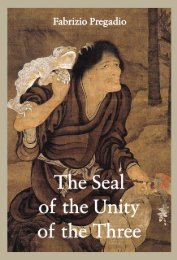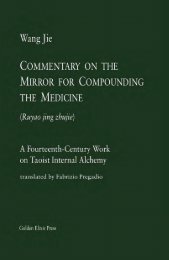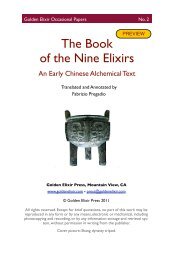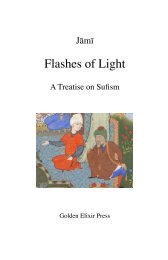The Seal of the Unity of the Three â Vol. 2 - The Golden Elixir
The Seal of the Unity of the Three â Vol. 2 - The Golden Elixir
The Seal of the Unity of the Three â Vol. 2 - The Golden Elixir
- No tags were found...
You also want an ePaper? Increase the reach of your titles
YUMPU automatically turns print PDFs into web optimized ePapers that Google loves.
4. <strong>The</strong> Ancient Text and Its Commentaries 191<br />
—————————————————————————————————————————<br />
3. QIU ZHAO’AO<br />
[24] Guben zhouyi cantong qi jizhu 古 本 周 易 參 同 契 集 注 , 1704<br />
Qiu Zhao’ao 仇 兆 鰲 (or 仇 兆 鼇 , 1638–1713, from Zhejiang), associated<br />
with <strong>the</strong> “Yin-Yang” branch <strong>of</strong> Neidan, obtained his jinshi<br />
degree in 1685 and served <strong>the</strong> Qing administration for some time as<br />
Vice Minister in <strong>the</strong> Ministry <strong>of</strong> Personnel. In addition to <strong>the</strong> commentary<br />
to <strong>the</strong> Cantong qi, he is also known for a commentary to <strong>the</strong><br />
Wuzhen pian (Wuzhen pian jizhu 悟 真 篇 集 注 ) and a commentary to<br />
Du Fu’s 杜 詩 poems (Du Fu xiangzhu 杜 詩 詳 注 ). 13<br />
<strong>The</strong> front matter <strong>of</strong> his Guben zhouyi cantong qi jizhu (Collected<br />
Commentaries on <strong>the</strong> Ancient Version <strong>of</strong> <strong>the</strong> Zhouyi cantong qi)<br />
includes an essay by Lu Xixing; Peng Xiao’s preface to his commentary,<br />
followed by Qiu’s remarks; and a section outlining <strong>the</strong> main<br />
editorial principles observed by <strong>the</strong> author. 14 <strong>The</strong> back matter contains<br />
<strong>the</strong> poetical essay on <strong>the</strong> Cantong qi attributed to Zhang Boduan (no.<br />
57), quoted from Lu Xixing’s Zhouyi cantong qi ceshu and including<br />
Lu’s commentary; <strong>the</strong> essay by Xiao Tingzhi (no. 56); hagiographic<br />
materials on Wei Boyang; and several illustrations.<br />
In addition to his own annotations, Qiu Zhao’ao quotes passages<br />
from several o<strong>the</strong>r earlier commentaries. His list <strong>of</strong> sources enumerates<br />
<strong>the</strong> works <strong>of</strong> sixteen authors, consisting <strong>of</strong> <strong>the</strong> extant commentaries<br />
to <strong>the</strong> standard text by Peng Xiao, Zhu Xi, Chen Xianwei, Yu<br />
Yan, Chen Zhixu, Xu Wei, Lu Xixing (Kouyi), Zhen Shu, Jiang<br />
Zhongzhen, and Tao Susi; <strong>the</strong> extant commentaries to <strong>the</strong> Ancient<br />
Text by Wang Jiachun, Peng Haogu, and Jiang Yibiao; <strong>the</strong> now-lost<br />
commentaries to <strong>the</strong> standard text by Li Wenzhu and Yin Taixuan;<br />
and Du Yicheng’s original edition <strong>of</strong> <strong>the</strong> Ancient Text.<br />
13<br />
On Qiu Zhao’ao see Wu Shuling, “Qiu Zhao’ao sixiang gaishuo”; and<br />
Pregadio, ed., <strong>The</strong> Encyclopedia <strong>of</strong> Taoism, 2:811–12.<br />
14<br />
Lu Xixing’s essay, entitled “Cantong Wuzhen zonglun” 參 同 悟 真 總 論<br />
(A General Discourse on <strong>the</strong> Cantong qi and <strong>the</strong> Wuzhen pian), corresponds<br />
to <strong>the</strong> postface <strong>of</strong> his Jindan jiuzheng 金 丹 就 正 (<strong>The</strong> Correct Understanding<br />
<strong>of</strong> <strong>the</strong> <strong>Golden</strong> <strong>Elixir</strong>). <strong>The</strong> section on <strong>the</strong> editorial principles is entitled “Liyan<br />
ershi tiao” 例 言 二 十 条 (Explanatory Notes in Twenty Points).<br />
Visit <strong>the</strong> Web page on this book • www.goldenelixir.com


